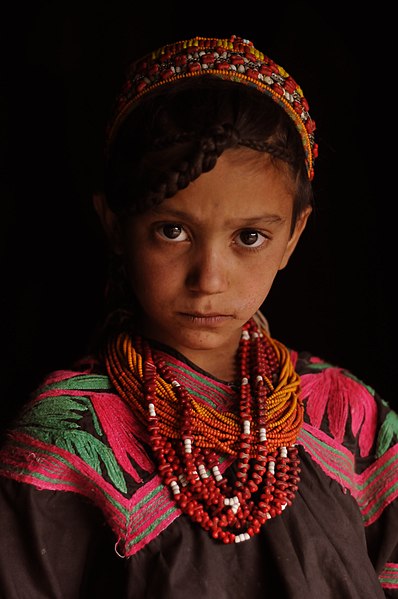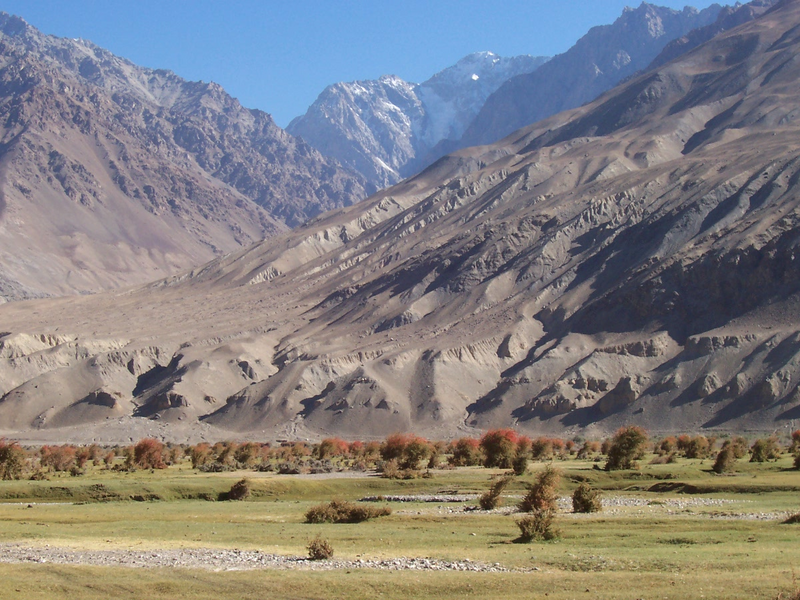 |
Kalasha Girl Photo Courtesy of Dave Watts
|
A lot of Kalash and Nuristani fairy tales resemble those of Europe and thanks to their clear this and the light hair and blue eye color some of them have the first European explorers to enter see them believed that they were descended from Alexander the Greats invasion of India.
DNA evidence shows however that they were part of the Indo-Iranian migration that brought the Vedic peoples to India and so are only related to Europeans through their Proto-Indo-European ancestors.
Because of this they have a pantheon of deities much like one would expect from an Indo-European people. However unlike the frivolous Greek deities who are constantly seducing each other and squabbling over the most petty of things the Deities of the Hindukush seem to be primarily focused on defeating evil as the Norse and Vedic deities did. This is possibly a result of their folk belief in giant troll like creatures that roam the
valleys around their homes with which their deities have to do battle.
As with many people who still have a fairy faith it is often times difficult to distinguish between their veneration of the fairiesand the deities. Indeed it has been claimed that they have some 18,000 deities a number which would certainly indicate that there is a spectrum of transition
from fairy to deity. Further they burn sacrifices to fairy some fairy like creatures in order to obtain success in battle, venerating some of their fairy figures the way one would a deity. Indeed their are a number of rituals to lure fairies and deities down out of the mountains using the smell of burnt offerings of animals, juniper, vinegar and or butter the smell of which these
beings are said to love. The peoples of the Hindukush live in a dualistic world, one that is divided not so much between the good and the evil but between the pure and the impure. Between the male and female worlds and elements. Men herd animals and hunt in the higher mountains. The high mountains are pure and so hunting within them helps to purify them from the time they spend in the less pure lower valleys and farms where the women work.
 |
| Hindu Kush Mountains Photo courtesy of Wikipedia |
It is high in the mountains that the fairies live trooping down into the valleys only occasionally to follow their fairy paths much as the people of Europe believed trooping fairies did and as with Europe it was dangerous to build houses in the fairy paths for doing so would cause the
fairies to act as poltergeists destroying objects and bringing bad luck and illness until the construction was removed from their path. Because of this people believe that it was important to be very aware of the other world. Adding to this importance is the fact that they also believed that fairies were the guardians of the animals, but most especially the markhors (a type of mountain goat which are the favored game of the hunters) are said to be the fairies herd animal. This means that there’s a close connection between the fairies and the hunters because peoples success in hunting doesn’t come from their skill rather its believed that in order of a hunter to killa markhor the fairiesmust take their share by eating the animal first. The Fairies will then gather up the markhors bones and then bring it back to life at which point they’ll tell it which hunter they should allow to catch it. Because the fairies own all
the animals of the mountains and choose to send the makhors to the hunter
rather then the hunter gaining his game through skill there is no reason to
brag because of a successful hunt or to be stingy with the food. After all
since the only reason a hunter was successful was because the fairies shared
their animal with him stinginess would be disrespectful and those who acted too
boastfully about their hunt would be punished by the other members of the
village.
There are a few tales of hunters who manager to take aim at a markhor which the fairies have not given to him, however thefairies always intervene, preventing the hunter from killing the animal. In many stories they then punish any hunter unlucky enough to have tried to shoot
an animal that they didn’t want them to. Most punishments are mild, involving
scaring the hunter however on occasion they well imprison the hunter for a
number of months.
The fairies live much as humans would, eating millet mixed with walnuts as well as wild animals in villages that are stratified in the same way that human villages are between men and women. However despite the surface similarities the fairies are much more fantastic for they control all the animals of the mountains such that just as markhor are the fairies herd
animals mountain leopards and bears are said to be their dogs.
Further fairies are believed to be far more beautiful then any human, they are in essence much more pure and are able to travel through impossible crevasses in the rocks. They control the forces of nature and seem to have a sixth sense as they are almost always able to
know when a hunter is about to shoot an animal they don’t want them too.
At least some of these powers are conferrable to humans through the use of a
powder applied to a humans eyes that the fairies carry with them in much the
way that humans in Europe gained fairy sight by getting fairy water in their eyes.
Occasionally fairies would invite a human to their homes, rubbing their magical powder in the humans eyes so they could travel the impossible fairy paths and it is from these few encounters that we have our stories of the fairies world. Such interactions were very rare at best. Indeed it was extremely rare for the fairies to speak to humans at all, and only a
very few people were fortunate enough to be able to speak with the fairies
regularly, to negotiate with them when someone is kidnapped by them. Its
uncertain how someone gained the right to be able to speak with fairies when
they tended to ignore most people. Those who could were important to the
societies of the Hindukush as only they were entitled to make the sacrifice of
a hornless goat in ransom for a missing hunter which the people believed had
been taken by the fairies.










0 comments:
Post a Comment